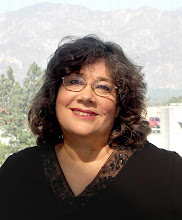
Barbara Ellis wins with her 8:49 a.m. Tuesday comment "My guess is that this is one of the more than 600 Japanese-Americans assembled at the Rose Bowl who left before dawn on March 23rd 1942 in a huge convoy heading for Manzanar, with almost 200 driving their own vehicles." Others were warm but Barbara hit it right on the head!
In the photo above, an unidentified man waves farewell just before dawn on March 23, 1942, after being processed at the Rose Bowl Stadium for residency at the Manzanar internment camp.
The stadium, Santa Anita Racetrack in Arcadia and the Fairplex in Pomona were among the processing centers and assembly areas for persons of Japanese descent living in western regions of Pacific coast states who would be relocated temporarily to camps in interior regions of California, Arizona, Utah and Wyoming.
I didn't know until I heard Joel Sheldon speak at an event on Sunday that Vromans Bookstore regularly sent boxes of books to Manzanar during this period.
Excerpt from the Los Angeles Times, March 22, 1942:
Tomorrow morning approximately 1000 Japanese will leave for the evacuation city on a special train and in busses, while a huge motorcade, again under the convoy of the Army, will depart from the Rose Bowl in Pasadena for the same destination.Before the war there were several businesses in Pasadena owned by Japanese American residents, most in the area bordered by Walnut Street, California Boulevard, Orange Grove Boulevard and Marengo Avenue. See a map showing businesses in 1940 here.
General instructions to Japanese leaving here for Manzanar tomorrow morning were issued yesterday by Maj. Gen. Walter Wilson, commanding the Southern California area.
Each person, the orders declared, will be required to bring all bedding except mattresses, all tools of his trade, clothing, cooking utensils, a one-gallon container of drinking water and his personal belongings. Baggage will be limited to what each person can carry with him and to what can be carried by baggage facilities on train or bus.

Many Japanese American residents belonged to the Pasadena Union Presbyterian Church. There is an honor roll displayed on the front window in this photo that lists the 117 Japanese Americans from Pasadena who were serving in the U.S. military at the time. The church offered free storage for the belongings of Japanese Americans who were interned at camps during the war years, then served as a dormitory and job placement facility when they returned to Pasadena.
It was one of hundreds of buildings demolished to make room for the 210 Freeway. Although the structure is no more, the ministry lives on as part of the First Presbyterian Church in Altadena.
Pasadena City College is looking for former Japanese American students who were forced to leave PCC because of World War II internment. Honorary degrees will be bestowed by PCC during commencement festivities in June as part of the California Nisei College Diploma Project.
President Ronald Reagan signed into law the Civil Liberties Act of 1988, legislation on behalf of the U.S. government that apologized for the internment of Japanese Americans, called for public education about the camps and provided for restitution. More more than $1.5 billion in reparations were paid to individuals and heirs.
The Japanese culture lives on in our community with organizations such as the Pasadena Japanese Cultural Institute and the Pasadena Buddhist Temple.
Many thanks to Pasadena Public Library.

10 comments:
Mucho congratulations to BEllis for waking up early, out of a warm bed, to give you her final answer!!
And, thanks to our city professor - de PIO - for another stimulating history class!
Congratulations, BEllis!
And I hope that none of us ever stops feeling a sense of disbelief and outrage when we read these accounts. Without outrage, we're doomed to repeat.
Yay Bellis.
Of course Susan is right. Disbelief, outrage, and profound sadness.
I was shocked to learn that the US Army was on stand-by in case these poor people didn't go voluntarily. But it's amazing what governments can do at a time of national crisis, when protestors are considered unpatriotic.
This was so interesting! Thank you for posting this history!
There was a camp (Minidoka) near my mother's town of Twin Falls, Idaho. She used to tell of visiting her friend there and sneaking her out in the trunk of the car. I don't know if it's true but I like to think so. They couldn't be seen in public, surely. But my mother wasn't one to be told she couldn't do something.
My K9 intuition tells me our govt has even more power over our lives now than back in those old fashioned days. Even the rich aren't safe anymore.
You didn't mention Joe Hiyashi, the Pasadena native who was recruited into the US Army out of the camps and earned the Congressional Medal of Honor. (To my knowledge, Pasadena's only recipient of that recognition for gallantry in the line of duty.)
Paul
Fascinating. Loved this one.
Thanks for this post. My mother was born in one of the camps (in Poston, AZ) so it touches my heart when others make sure we don't forget what happened. You are a gem!
Post a Comment